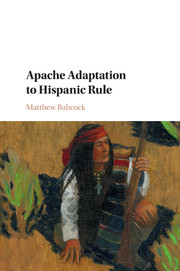4 - Acculturation and Adaptation
Published online by Cambridge University Press: 05 September 2016
Summary
On October 29, 1790, Lieutenant Ventura Montes's Spanish patrol escorted Nantan Volante's group of Mescaleros off their protected reservation at Presidio del Norte and onto the open and exposed southern plains to hunt buffalo. Volante knew this territory well because Mescaleros had once controlled it, and he hoped that Spanish troops might help them reclaim it from their Comanche archenemies. Upon making camp south of San Antonio along the Nueces River in late November, Volante and his people breathed a sigh of relief. Six Mescalero women, held captive in Coahuila and recently released by Commander-in-Chief of the Interior Provinces Jacobo Ugarte, had arrived to help prepare the hides and meat. But their reconciliation was short-lived. The women explained that “a party of Comanches” had killed their escort, the interpreter Francisco Pérez, in a driving “snow and hail storm.” Incensed at this unprovoked violent act and unbeknownst to Lieutenant Montes and his troops, Volante and the Mescaleros ambushed a Comanche ranchería the following day, “which they attacked repeatedly, killing three and taking various captives of both sexes” before returning to their reservation.
This chaotic series of events highlights the complicated nature of Indian relations on early North American frontiers, and reveals the blurred cultural and spatial borders between Apaches, Comanches, and Spaniards in the colonial Southwest. As a well-respected historian has argued, through the acquisition of new values, skills, sensibilities, and technologies, enlightened Bourbon officials and powerful independent Indians were relating to each other in new ways across the frontiers of the Americas in the late eighteenth century. Yet what was transpiring between Spaniards, Apaches, and Comanches on the ground in the fall of 1790 was not what any of the parties, especially Bourbon policy makers, intended. Several key questions come to mind: How did the Spanish-run reservations that Mescaleros and other Ndé groups agreed to live on function in practice? Why were Spaniards, who had negotiated peace treaties with Comanches in Texas and New Mexico, escorting Mescaleros into the Comanchería to hunt buffalo? And what efforts, if any, would these groups make to reconcile relations?
- Type
- Chapter
- Information
- Apache Adaptation to Hispanic Rule , pp. 141 - 171Publisher: Cambridge University PressPrint publication year: 2016

